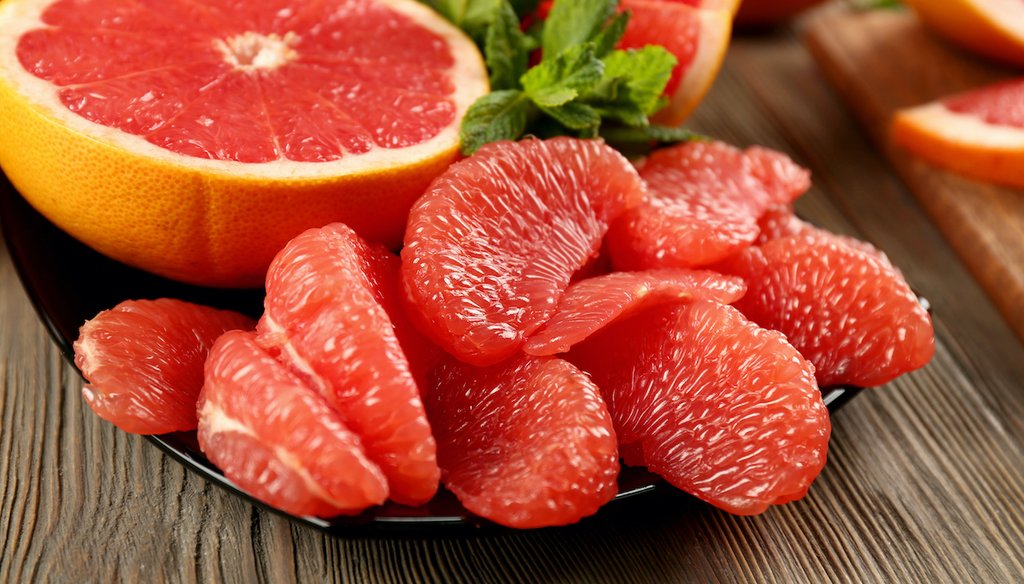



Grapefruit can pose a risk to people who are on certain medications, but there’s no proof it is fatal for those on antidepressants, as a Facebook post claims. (Shutterstock)
Grapefruit can pose a risk to people who are on certain medications, but there’s no proof it is fatal for those on antidepressants.
A Facebook post claims that eating grapefruit or drinking grapefruit juice presents a known deadly risk for people taking antidepressants.
"Since grapefruit season is coming up soon, this is a friendly reminder that you CANNOT eat grapefruit if you're on antidepressants. It can cause a fatal overdose," the widely shared post states.
The use of "reminder" indicates it’s been established that there is some occurrence of such fatalities. We found no evidence of that with antidepressants, though grapefruit can potentially cause a dangerous reaction if you’re taking certain medications.
The post was flagged as part of Facebook’s efforts to combat false news and misinformation on its News Feed. (Read more about our partnership with Facebook.)
"I am not aware of any evidence of fatality," said University of Nebraska Medical Center pharmacy professor Ally Dering-Anderson. "That doesn’t mean that patients won’t be very uncomfortable, even hospitalized from very high levels of antidepressants. But I am not aware of any reports of death from grapefruit and antidepressants. There are reports of death with other drug classes."
The Food and Drug Administration said it "has no data to support the claim that consuming a combination of grapefruit and antidepressant medication, when used as labeled and absent any other underlying medical issues, could be potentially fatal."
Grapefruit juice blocks an enzyme in the body, making it easier for a medication taken orally to pass from your gut to your bloodstream, according to an article on Harvard Medical School’s website. Levels of medication in the blood will rise faster and higher than normal, and in some cases, the abnormally high levels can sometimes be dangerous. For example, interaction with calcium channel blockers, which are not antidepressants, can lower your blood pressure or slow your heart rate excessively.
The article says medications that are "substantially boosted" in this way by grapefruit juice include diazepam (brand name Valium), triazolam (Halcion) and midazolam (Versed), which are prescribed for anxiety or insomnia; and neurological and psychiatric medications such as buspirone (BuSpar), sertraline (Zoloft) and carbamazepine (Tegretol).
Janice Hermann, a nutritional sciences professor at Oklahoma State University, said "grapefruit does not interact with the whole class of antidepressants, it’s only specific ones such as buspirone."
Dering-Anderson also said some antidepressants "are fine with grapefruit while others can get to dangerously high levels in the blood. The best way to know is to ask your pharmacist."
A Healthline article written by a Mayo Clinic doctor also stated that most antidepressants and anti-anxiety drugs are safe to use with grapefruit. Several mood medications, including buspirone, diazepam and midazolam, do interact with grapefruit juice, the article says.
Eating grapefruit while taking the mood-related medications "can result in heart rhythm changes, excessive sleepiness and other drug-specific effects," that article said.
The Harvard and Healthline articles, as well as an FDA article, say nothing about any potential fatal risk of ingesting grapefruit while on any medications.
The FDA told PolitiFact that grapefruit and grapefruit juice can interfere with how well certain medicines work. As a result, the FDA has required that some prescription and over-the-counter drug labels include warnings against drinking grapefruit juice or eating grapefruit while taking the drug."
Two other fact-checkers have identified flaws with the claim about grapefruit causing fatal overdoses from antidepressants. There are potential health risks, but there’s no evidence that they are fatal. We rate the claim False.
Facebook, post, Dec. 12, 2021
Email, Ally Dering-Anderson, clinical associate professor, University of Nebraska Medical Center College of Pharmacy, Dec. 17, 2021
Email, Food and Drug Administration press officer April Grant, Dec. 20, 2021
Truth Or Fiction, "Grapefruit Antidepressants Overdose Warning," Dec. 13, 2021
Email, Janice Hermann, nutritional sciences professor at Oklahoma State University, Dec. 21, 2021
Lead Stories, "Fact Check: NO Evidence That Mixing Grapefruit And Antidepressants Can Cause Fatal Overdose -- Combo MAY Cause Other Adverse Effects," Dec. 16, 2021
Healthline, "Grapefruit Warning: It Can Interact with Common Medications," May 7, 2020
Food and Drug Administration, "Grapefruit Juice and Some Drugs Don't Mix," July 1, 2021
Harvard Health Publishing, "Grapefruit and medication: A cautionary note," March 30, 2021
In a world of wild talk and fake news, help us stand up for the facts.
